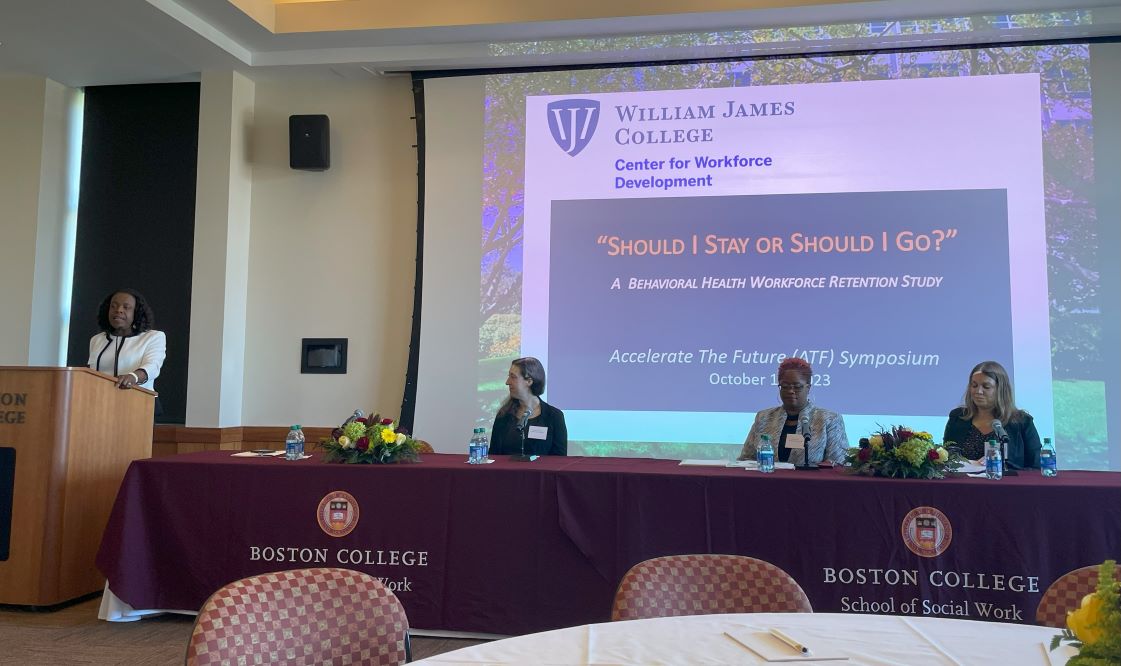Want Behavioral Health Workers to Stay? Intentionally Support Them

Last year, William James College received a $250,000 research grant from Accelerate The Future, a private foundation, to research building a scalable model with community health organizations to retain their workers while advancing their careers. On October 19, 2023, WJC presented the findings at the Accelerate The Future Behavioral Health Workforce Development Innovation Symposium at Boston College. WJC’s Gemima St. Louis, PhD, Natalie Cort, PhD, and Alexandra Alden, PhD, spoke on “Building a Scalable Workforce Retention Model with Community-Based Behavioral Health Organizations.”
Massachusetts’ post-covid behavioral health workforce is in crisis and there are two gaping weaknesses: a lack of cultural and linguistic competencies and a continued underrepresentation of certain communities, such as LGBTQIA+ and BIPOC. For the past year, WJC studied how to retain behavioral health providers, with a focus on underrepresented groups. Only 5% of the survey participants were not from underrepresented populations and all serve underrepresented populations.
St. Louis, WJC’s lead presenter, emphasized this fact: “The groups we studied are those most studies list as ‘limitations of the study’ in their appendix. For us, these groups are not an afterthought—they are the focus.”
The study found that those who were first-generation providers were experiencing financial stability, had more job satisfaction, or felt a sense of belonging were less likely to leave their organizations. Participants reported that flexible schedules, good work culture, and health benefits were the primary incentives keeping them in their organizations. Likewise, those with more education and more job satisfaction were less likely to leave the healthcare field. Along with the incentives keeping them in individual organizations, participants cited high pay as a factor keeping them in the field.
For many, personal life experiences motivate a career in mental health—they see the care they or family struggle to get and want to change that. Many want to fix the deficit of people like them in the field. Anecdotally, one of the biggest difficulties in diversifying mental health care is finding appropriate mentors to integrate the new generation.
WJC’s study participants shared a desire for unambiguous social justice initiatives within their organizations, not just cursory acknowledgment. Individuals from underrepresented groups need to be acknowledged for the invisible labor they perform, not expected to take the lead in educating their organizations about their group on top of doing their jobs.
Since the start of COVID-19, behavioral health providers have been experiencing increased burnout, often working at the edge of their capacity so any setback or life change brings them to the breaking point. They are consistently forced to choose between their own health and needs and those of their patients. Organizations need to intentionally care for the needs of their workers so the workers can serve their community without draining themselves.
“Staying at a job is not necessarily a sign of a healthy organization,” said Cort. “Many providers will stay because they are committed to their clients, committed to the work, or they simply need money.”
Self-care is crucial to the long-term retention of health workers. Organizations can contribute to this by incorporating employee feedback and intentionally and actively including and supporting employees. The workers are here and they are highly motivated. While behavioral health workers are caring for the mental health of our communities, it is the duty of employers to support their workers’ mental health.
WJC’s research team included the presenters, as well as Marc Abelard, MEd; Marie Forgeard, PhD; Bori Mahr, MEd, MA; Marta Pagan-Ortiz, PhD; and Anna Ustun, BS.
- Tags:
- Research & Advocacy
Topics/Tags
Follow William James College
Media Contact
- Katie O'Hare
- Senior Director of Marketing
- katie_ohare@williamjames.edu
- 617-564-9389
